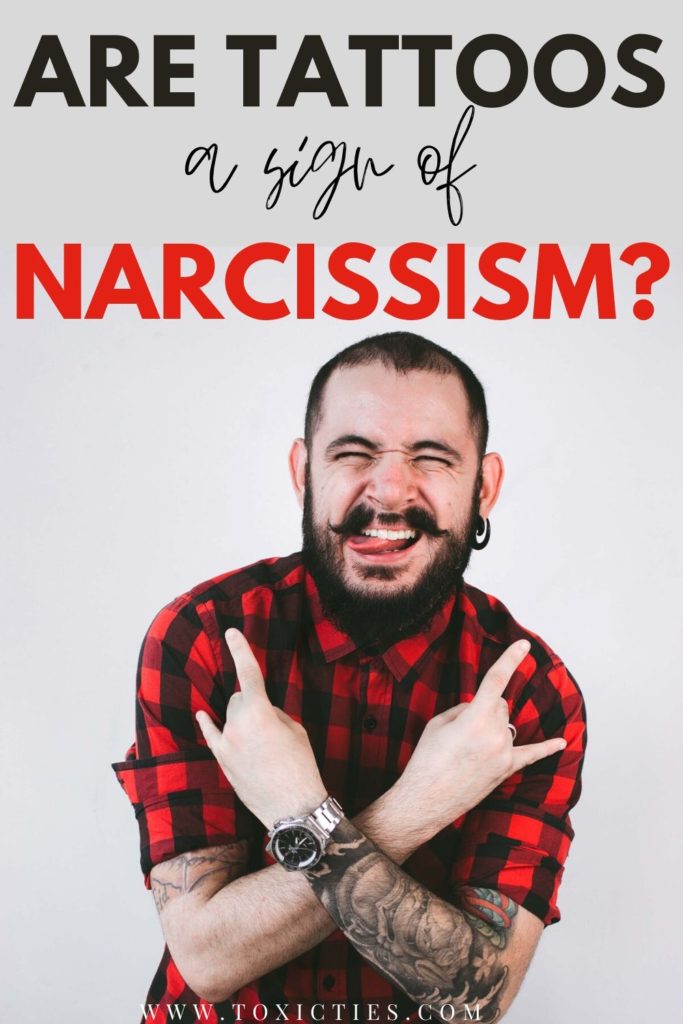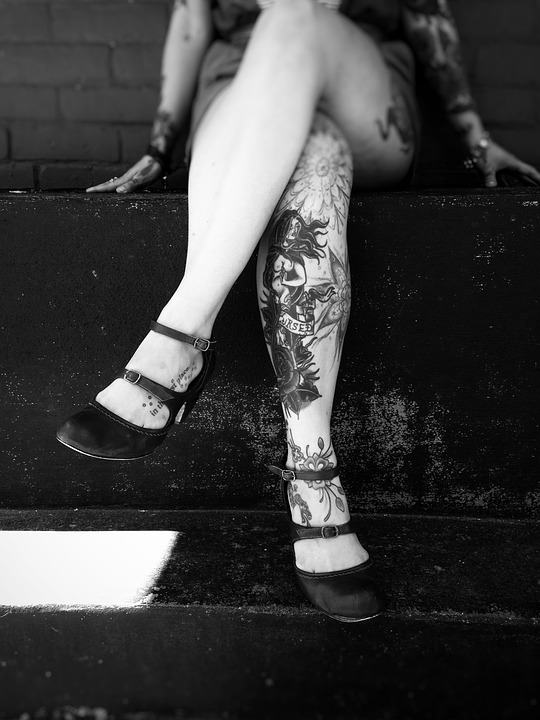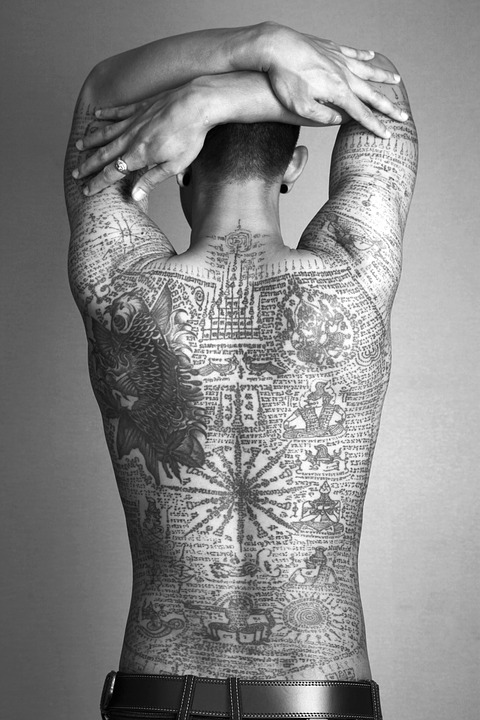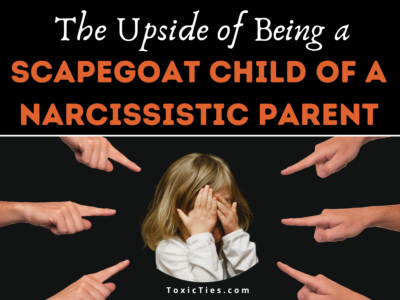Are tattoos a sign of narcissism, or simply a means of self-expression? The answer to this question may not be as straightforward as it seems.
Here is a scenario: you’re standing in line at Starbucks. The person in front of you is a young woman with a butterfly tattoo on her naked shoulder. You don’t mean to look, but an eye-catching inked image is hard to resist. You find yourself staring at it, and trying to decipher the line of cursive text circling the butterfly.
That is to say, tattoos tend to attract attention. They’re like big neon signs on the skin screaming “Look at me!” And people look.
That seems to suggest that tattoos represent attention-seeking behavior, which is a hallmark of narcissism.
So are tattoos a sign of narcissism? Let’s find out.

Why Do People Get Tattoos?
There’s a myriad reasons for why people get tattoos. Here are some of them.
- Improve self-image or self-esteem. In the words of Alex Bell, “some of us have piercings and tattoos and dye our hair because we think it looks pretty, not for any deep sociological reason.”
- Self-expression through body art. Tattoos can be representations of your beliefs, aspirations, past experiences, tributes to family and friends, reminders of important lessons, or just artistic adornments.
- Cultural heritage. The practice of tattooing is common in many cultures, both modern and ancient. In today’s America, tattoos are as common as ear piercings or faded jeans.
- Peer pressure. A group of drunk frat boys stumbles into a tattoo shop…You know what’s going to happen. Someone is getting a hideous tattoo on a dare! Yeah, in some circumstances, you can be pressured to get tattoos to prove masculinity or belonging to a certain peer group, i.e. marines, bikers, gang members etc.
- Act of defiance or rebellion. Tattoos can be a form of rebellion, when a group you identify with is prejudiced against tattoos. For example, religious groups like conservative Christians or Jews view the body as sacred, and prohibit body modification. In this case getting a tattoo would solidify your status as a rebel and an outsider.
- Attention. Depending on the type and placement of the tattoos, it can be a cry for attention. But then again, the same can be said about a hairstyle, clothes or the kind of car one drives.
- Just because. It’s conceivable that one can get a tattoo for no particular reason other than curiosity or boredom. Stranger things happen!

What’s Different About People With Tattoos?
Jack London said: “Show me a man with a tattoo and I’ll show you a man with an interesting past.” If he was alive today, he’d take it back.
While tattoos used to be a sign of social deviancy and non-conformity, it is now a very mainstream practice found in almost every population category.
Over 40% of Americans ages 26-40 have tattoos.
Still, tattooed people are not your typical Brady Bunch. Research shows that inked individuals do differ from the general population.
Among other things, they are more likely to:
- be diagnosed with mental health issues
- have spent time in jail
- be smokers
- have a higher number of sex partners
- have sleep issues
- engage in risky behavior.
Out of all this traits, one stands out as the most narcissistic: engaging in risky behavior. Much research and real-life examples (Wall Street) show that narcissists take more risks than others, although it’s not entirely clear why.
One reason could be that they overestimate their abilities to predict the outcome, and are too self-assured to consider the consequences of losing.
So tattooed people are more likely to take risks and have more sexual partners, just like narcissists.
But is a couple of common traits enough to equate the two?

Tattoos and Narcissism
Regardless of personal views, there’s something a little self-obsessed about tattoos, isn’t it?
People who get tattoos are very much focused on their self-image. It’s important to them how they are perceived, otherwise they wouldn’t get tattoos in visible places.
Self-image is also important to narcissists. But a narcissist’s self-image is a grandiose projection of a warped and fragile ego, while most inked individuals are simply expressing who they are.
Sure, sometimes tattoos are meant to cloak personal insecurities or project a desired trait. But more than anything, tattoos are artistic representations of our inner world, and what it is about ourselves we consider unique.
It’s not the attention-seeking that drives people to get tattoos. It’s the desire to be unique.
Tattoo wearers spend a lot of time looking for the right design, the right inscription, the right tattoo artist. It’s very deliberate, with a touch of perfectionism.
It can take someone years to find that distinctive design that will set them apart from the crowd.
And since inking went mainstream, it’s even harder to have a tattoo that’s one of a kind.
Could that obsession with uniqueness be narcissistic?
In a book “Tattoo: Secrets of a Strange Art” author Albert Parry says that people want to get unique tattoos “to express their love for themselves and their proud belief that they are different from other people.” That carries a certain element of narcissism.
However, he points out that the truly narcissistic consider themselves perfect already. They don’t want any tattoos. Their skin is “already perfect and endowed with all the glory and beauty of unadorned nature.”
Tattoos Are Stories Etched in the Skin
I have 7 tattoos. Some I like, some I live with.
I got my first tat, a vine going around my ankle, when I was 17, in Spain.
To me, that tattoo was a rite of passage. It was a distinguishing mark that separated me from all the previous generations. You see, I come from a family where no one has tattoos. I guess I wanted to be different.
Was it narcissistic of me? I suppose it was. We’re all narcissistic to a degree.
But I’d like to think it wasn’t my main motivation.
I also wanted to mark the experience. I wanted to remember the warm Mediterranean sun, and the new sense of freedom I felt.
At the time, I was an awkward lanky kid who was transforming into a young woman with long legs, raven hair, and ambitious dreams. And it was scary, but also exhilarating and freeing. I wanted to remember that feeling.
Fast-forward 20 years, and I still have the urge to get a tattoo every time I reach a milestone, be it an external event, or some kind of internal change.
And I don’t see myself stopping anytime soon, to the dismay of my family. I hear them say: “I could never do that. It’s so permanent. What if you regret it later?”
It makes me laugh how people think their bodies are “permanent.” Nothing is permanent. Even if you don’t get tattoos, time and life will put their own marks on your body.
At least with tattoos, you get to choose the design.
So maybe tattoos are a little narcissistic. But not in a clinical, malignant sense. It’s everyday narcissism, like finding yourself first when you look at a group photo.
And in my experience, most narcissists would never get tattoos because they think they’re perfect the way they are.
What do you think? Do you think tattoos are a sign of narcissism?
NEXT
7 Clever Dating Games All Narcissists Play








People with tattoo’s are ABSOLUTELY narcissists, hands down absolute “look at me” narcissistic grubs. Just look at how they all dress FFS, They ALWAYS dress to show off every single piece of ink they can get away with showing without an indecency charge, EVERY SINGLE ONE OF THEM. They’re ALL 100% about “look at me”. “LOOK AT ME…”, “look at how individual I am by complying with every other compliant Sheeple moron who’s done exactly the same thing to look “cool” and had their skin stained irreparably by ink because I want to look cool and I stupidly think that complying with the crowd somehow makes me look like an individual 🤦♂️🤦♂️🤦♂️”. Tattoo wearers are as dumb as they come. Do what you want but don’t expect me to hire you or treat you like anyone worthy of respect when you don’t even respe t yourself or your own body.
I feel like I carry around some of the best portraits an artist could render illustrating one’s imagination. I’m obsessed with the artwork, sometimes staring at how remarkable this form of art is and how extraordinarily talented tattoo artists are at creating art using human flesh as their canvas.
Hi Ricardo,
You’re lucky to have such gifted artists ink your skin. It’s hard to find a perfect equilibrium between your vision, your artist’s vision, and their skill level. I guess I’m still looking 🙂
Lana
Nope. I know at least 3 narcissists that have zero ink
The only narcissists I know are also ink-less but It’s difficult to generalize… I think tattoos can be considered a little narcissistic, but it’s not a sign of narcissism. At least not in the clinical sense.
Thanks for the comment!
This was interesting, thank you. I always thought it was insecurity that led people to getting tattoos. I have an altruistic narcissist parent, martyr parent type deal, the other was obviously the enabler. Neither have tattoos. It’s funny how they can raise you to think. Thanks for helping me debunk another “inherited”(wrong word) ideology.
I might be open to getting a tattoo now, never wanted one before, don’t really want one now, but maybe a moment will come one day where I do after settling this.
Hi Perry,
I think it’s less common for the older generation to have tattoos, and I personally encountered a narcissist who was really into tattoos. My narcissistic MIL detests my tattoos but I think it’s more an issue of cultural differences than a personality disorder.
If you do decide to get a tattoo one day, skip the snakes, daggers, and naked ladies 🙂